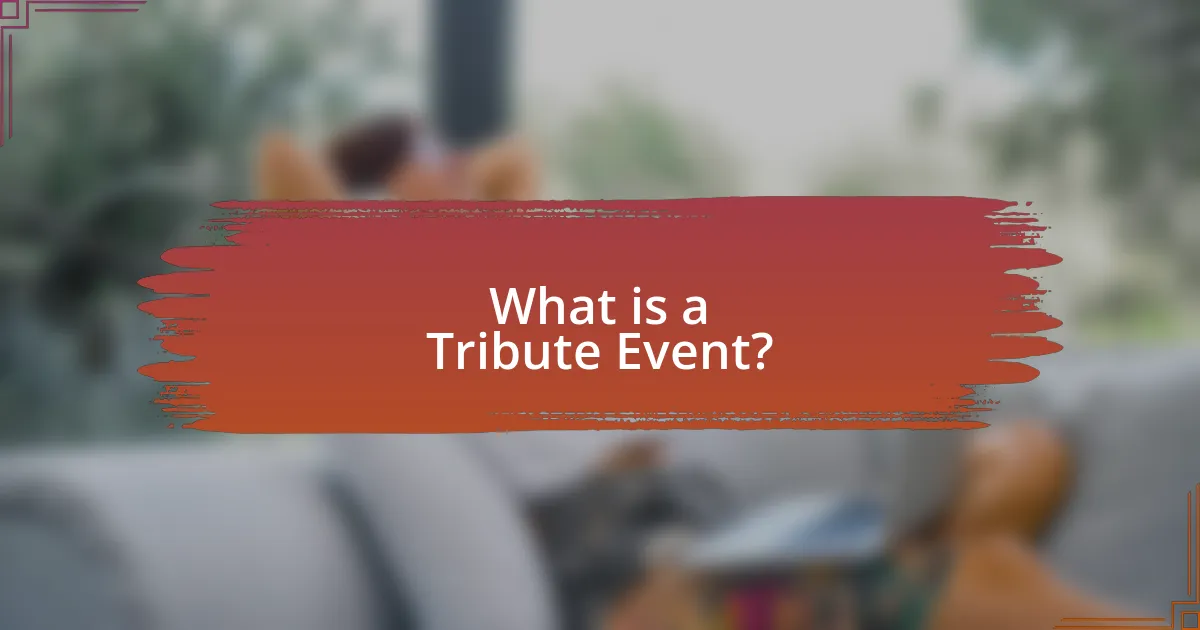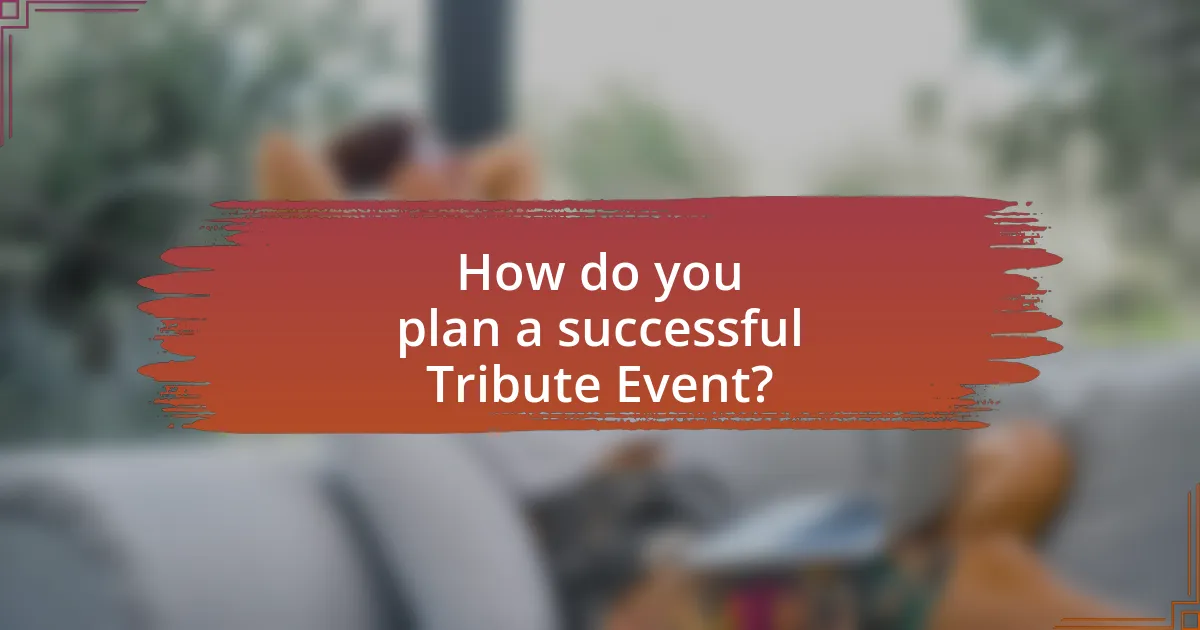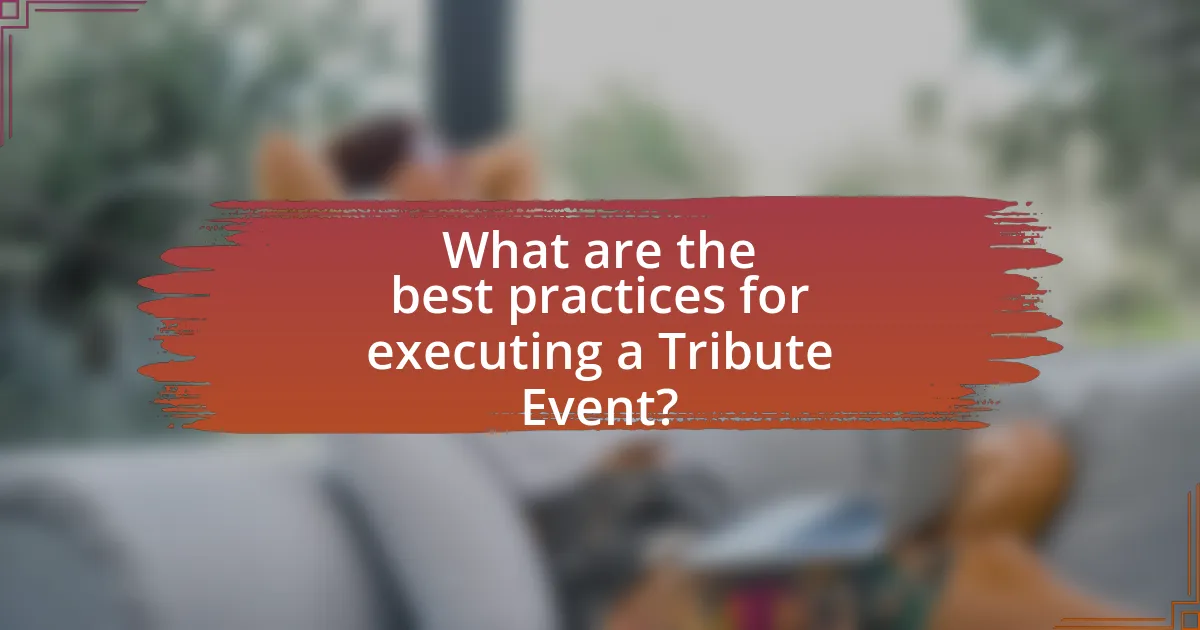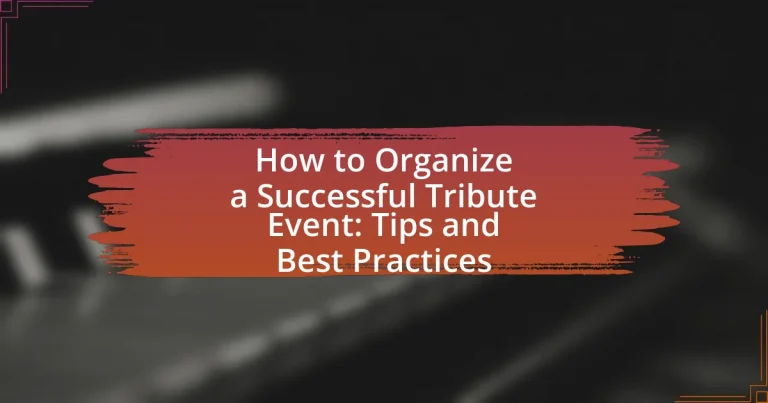A tribute event is a gathering designed to honor and celebrate the achievements or memory of an individual or group, featuring elements such as speeches, performances, and presentations. This article outlines the key elements that define tribute events, including their purpose, audience, and emotional engagement, while distinguishing them from other event types. It also provides practical guidance on planning a successful tribute event, covering essential steps such as defining the event’s purpose, budgeting, selecting a venue, and promoting the event effectively. Additionally, the article addresses common challenges faced during tribute events and offers strategies for ensuring smooth execution and gathering feedback for future improvements.

What is a Tribute Event?
A tribute event is a gathering organized to honor and celebrate the achievements, contributions, or memory of an individual or group. These events often include speeches, performances, and presentations that reflect the significance of the honoree’s impact on a community or field. For example, tribute events can commemorate influential figures in arts, sciences, or social movements, showcasing their legacy and inspiring others.
How do Tribute Events differ from other types of events?
Tribute events differ from other types of events primarily in their purpose, which is to honor and celebrate the life, achievements, or memory of a specific individual or group. Unlike general events that may focus on entertainment, networking, or education, tribute events are deeply personal and often involve elements such as speeches, performances, or presentations that reflect the honoree’s impact. For example, a tribute concert may feature artists performing songs associated with the individual being honored, creating a unique atmosphere that emphasizes remembrance and appreciation. This focus on commemoration sets tribute events apart, making them emotionally resonant and significant for attendees.
What are the key elements that define a Tribute Event?
A Tribute Event is defined by several key elements: purpose, honoree, audience, format, and emotional engagement. The purpose of a Tribute Event is to honor and celebrate an individual or group for their contributions or achievements. The honoree is the central figure being recognized, which can be a person, organization, or cause. The audience consists of attendees who share a connection to the honoree, enhancing the event’s significance. The format can vary, including speeches, performances, or multimedia presentations, tailored to reflect the honoree’s legacy. Emotional engagement is crucial, as it fosters a connection between the honoree and the audience, often evoking memories and shared experiences. These elements collectively create a meaningful and impactful Tribute Event.
Why are Tribute Events important for honoring individuals?
Tribute events are important for honoring individuals because they provide a structured opportunity to recognize and celebrate the contributions and impact of a person on their community or field. These events foster a sense of connection among attendees, allowing them to share memories and express gratitude, which can enhance collective healing and remembrance. Research indicates that public acknowledgment through such events can significantly boost the morale of communities and individuals, as seen in studies highlighting the psychological benefits of communal gatherings for honoring legacies.
What types of Tribute Events can be organized?
Various types of tribute events can be organized, including memorial services, tribute concerts, award ceremonies, and commemorative dinners. Memorial services honor the deceased, allowing family and friends to share memories and celebrate their life. Tribute concerts feature performances dedicated to an artist or individual, often raising funds for a cause related to them. Award ceremonies recognize achievements in specific fields, celebrating contributions and legacies. Commemorative dinners bring people together to reflect on the impact of an individual or cause, often including speeches and presentations that highlight their significance. Each type serves to honor and remember individuals or causes in meaningful ways.
How do memorial services differ from celebratory tribute events?
Memorial services focus on honoring and remembering a deceased individual, often incorporating elements of grief and reflection, while celebratory tribute events emphasize celebrating the life and achievements of a person, typically in a more uplifting and joyous atmosphere. Memorial services often include rituals such as eulogies, prayers, and moments of silence, which serve to acknowledge loss and provide comfort to the bereaved. In contrast, celebratory tribute events may feature speeches, performances, and activities that highlight positive memories and accomplishments, fostering a sense of community and joy among attendees.
What are some examples of Tribute Events for various occasions?
Examples of tribute events for various occasions include memorial services, which honor the deceased; retirement parties, celebrating an individual’s career; and award ceremonies, recognizing achievements in specific fields. Memorial services often feature speeches and remembrances, while retirement parties may include presentations and gifts. Award ceremonies typically involve formal recognition and accolades, showcasing the accomplishments of individuals or groups. Each type of event serves to honor and celebrate significant milestones or contributions in a person’s life or career.

How do you plan a successful Tribute Event?
To plan a successful Tribute Event, start by defining the purpose and theme of the event, ensuring it resonates with the audience and honors the individual or cause being celebrated. Next, create a detailed budget that includes venue costs, catering, entertainment, and promotional materials, as financial planning is crucial for event success.
Select an appropriate venue that accommodates the expected number of attendees and aligns with the event’s theme, as the right setting enhances the overall experience. Develop a timeline that outlines key milestones leading up to the event, including deadlines for invitations, vendor bookings, and promotional activities, which helps keep the planning process organized.
Engage with stakeholders, such as family members, friends, or community leaders, to gather input and support, as collaboration can enrich the event’s content and reach. Promote the event through various channels, including social media, local press, and community boards, to maximize attendance and awareness.
Finally, ensure that logistics, such as seating arrangements, audiovisual equipment, and catering services, are meticulously planned and executed on the event day, as attention to detail can significantly impact the event’s success.
What are the initial steps in organizing a Tribute Event?
The initial steps in organizing a Tribute Event include defining the purpose and theme of the event, selecting a date and venue, and assembling a planning committee. Defining the purpose clarifies the event’s focus, whether it is to honor an individual, celebrate a milestone, or raise funds for a cause. Selecting a date and venue ensures that the event is logistically feasible and accessible to attendees. Assembling a planning committee brings together individuals with diverse skills and resources, facilitating effective organization and execution. These steps are foundational for a successful Tribute Event, as they establish a clear direction and framework for further planning.
How do you determine the purpose and theme of the event?
To determine the purpose and theme of an event, start by identifying the primary goals and objectives that the event aims to achieve. This involves consulting with stakeholders, such as organizers and potential attendees, to gather insights on their expectations and desired outcomes. For example, if the event is a tribute, the purpose may be to honor a specific individual or cause, while the theme could reflect the values or achievements associated with that tribute. Researching similar events can provide context and inspiration, ensuring that the chosen theme resonates with the target audience and aligns with the event’s objectives.
What factors should be considered when selecting a date and venue?
When selecting a date and venue for a tribute event, key factors include availability, capacity, location, and accessibility. The availability of both the venue and the desired date is crucial, as popular venues may be booked well in advance. Capacity must align with the expected number of attendees to ensure comfort and engagement. The location should be convenient for guests, ideally near public transportation or parking options, to maximize attendance. Accessibility is essential for all guests, including those with disabilities, ensuring that the venue meets legal standards and provides necessary accommodations. These considerations are supported by event planning best practices, which emphasize the importance of logistics in successful event execution.
How do you create a budget for a Tribute Event?
To create a budget for a Tribute Event, start by identifying all potential expenses and income sources. This includes venue rental, catering, entertainment, decorations, marketing, and any additional costs such as permits or insurance. For instance, if the venue costs $2,000, catering is estimated at $1,500, and entertainment is $800, the total expenses would be $4,300.
Next, estimate the expected income from ticket sales, sponsorships, and donations. If you anticipate selling 200 tickets at $30 each, that generates $6,000 in revenue. Subtract total expenses from total income to determine the budget surplus or deficit. In this example, $6,000 (income) minus $4,300 (expenses) results in a surplus of $1,700.
Finally, monitor and adjust the budget as necessary throughout the planning process to ensure financial goals are met. This structured approach ensures that all financial aspects are accounted for, leading to a successful Tribute Event.
What are the essential costs to include in the budget?
The essential costs to include in the budget for organizing a tribute event are venue rental, catering, entertainment, decorations, marketing, and permits. Venue rental typically accounts for a significant portion of the budget, as it includes the cost of the space where the event will take place. Catering costs encompass food and beverage expenses, which can vary based on the number of guests and menu selection. Entertainment expenses may include fees for speakers, musicians, or performers, which are crucial for engaging the audience. Decorations enhance the event’s atmosphere and should be budgeted accordingly. Marketing costs are necessary for promoting the event and can include advertising, printing materials, and online promotions. Lastly, permits may be required depending on the location and nature of the event, adding to the overall budget.
How can you find sponsorships or donations to support the event?
To find sponsorships or donations to support the event, you should identify potential sponsors aligned with your event’s mission and audience. Research local businesses, corporations, and philanthropic organizations that have a history of supporting similar events or causes. For instance, according to a 2021 study by the Association of Fundraising Professionals, 70% of corporate sponsors prefer to support events that resonate with their brand values. Create a compelling sponsorship proposal that outlines the benefits for sponsors, such as brand visibility and community engagement. Additionally, leverage social media and networking platforms to reach out to potential sponsors and donors, as 80% of successful fundraising campaigns utilize these channels for outreach.

What are the best practices for executing a Tribute Event?
The best practices for executing a Tribute Event include thorough planning, clear communication, and attention to detail. Effective planning involves setting a clear purpose for the event, identifying the target audience, and establishing a budget. Clear communication ensures that all stakeholders, including participants, sponsors, and volunteers, understand their roles and responsibilities. Attention to detail encompasses selecting an appropriate venue, coordinating logistics such as catering and audiovisual needs, and creating a meaningful program that honors the individual or cause being celebrated. These practices are supported by successful case studies, such as the Tribute to Nelson Mandela in 2013, which highlighted the importance of meticulous organization and community involvement in creating a memorable experience.
How do you promote the Tribute Event effectively?
To promote the Tribute Event effectively, utilize a multi-channel marketing strategy that includes social media, email campaigns, and partnerships with local influencers. Social media platforms like Facebook and Instagram allow for targeted advertising, reaching specific demographics interested in tribute events. Email campaigns can inform past attendees and interested parties about event details, creating a sense of urgency through limited-time offers or early bird pricing. Collaborating with local influencers can amplify reach, as they can share the event with their followers, increasing visibility and credibility. According to a study by HubSpot, businesses that use social media marketing see a 126% increase in lead generation, demonstrating the effectiveness of these promotional strategies.
What channels are most effective for reaching the target audience?
Social media platforms, email marketing, and community engagement events are the most effective channels for reaching the target audience for a tribute event. Social media allows for targeted advertising and organic reach, with platforms like Facebook and Instagram enabling event promotion to specific demographics. Email marketing provides direct communication to interested individuals, ensuring that updates and invitations reach the right people. Community engagement events, such as local gatherings or partnerships with relevant organizations, foster personal connections and encourage attendance. According to a study by Eventbrite, 80% of event organizers find social media to be the most effective channel for promoting events, highlighting its significance in reaching the target audience.
How can social media be utilized to enhance event visibility?
Social media can enhance event visibility by leveraging platforms to reach a broader audience and engage potential attendees. Utilizing targeted advertising on platforms like Facebook and Instagram allows event organizers to promote their events to specific demographics, increasing the likelihood of attendance. Additionally, creating event pages and sharing engaging content, such as videos and images, can generate buzz and encourage sharing among users. According to a study by Eventbrite, 95% of event creators believe social media is essential for promoting their events, highlighting its effectiveness in increasing visibility.
What roles do volunteers and staff play in a Tribute Event?
Volunteers and staff play crucial roles in a Tribute Event by ensuring its smooth execution and enhancing the overall experience for attendees. Staff members typically handle logistical tasks such as venue setup, coordination of schedules, and management of resources, while volunteers often assist with guest services, registration, and providing information to attendees. Their combined efforts contribute to creating an organized and welcoming environment, which is essential for the success of the event. For instance, effective staff management can lead to a 30% increase in attendee satisfaction, as reported in event planning studies.
How do you recruit and train volunteers for the event?
To recruit and train volunteers for the event, organizations typically utilize targeted outreach strategies and structured training programs. Effective recruitment involves leveraging social media platforms, community bulletin boards, and local organizations to attract individuals interested in volunteering. For instance, a study by the Corporation for National and Community Service indicates that 63 million Americans volunteered in 2017, highlighting the potential pool of volunteers available through community engagement.
Training volunteers is essential for ensuring they understand their roles and responsibilities. This can be achieved through orientation sessions, hands-on workshops, and providing clear written materials outlining tasks and expectations. Research shows that well-trained volunteers are more likely to have a positive experience and contribute effectively, as evidenced by a report from the National Volunteer Center, which states that organizations with comprehensive training programs see a 30% increase in volunteer retention rates.
What responsibilities should be assigned to staff and volunteers?
Staff and volunteers should be assigned responsibilities that align with their skills and the needs of the tribute event. Staff typically manage logistics, oversee event planning, and coordinate with vendors, ensuring that all operational aspects run smoothly. Volunteers often handle guest registration, assist with setup and breakdown, and provide support during the event, enhancing attendee experience.
For instance, staff may be responsible for budgeting and scheduling, while volunteers can be tasked with greeting guests and distributing materials. This division of labor allows for efficient event execution and maximizes the strengths of both staff and volunteers, contributing to a successful tribute event.
What are common challenges faced during a Tribute Event?
Common challenges faced during a Tribute Event include logistical coordination, emotional responses from attendees, and budget constraints. Logistical coordination involves managing venue arrangements, catering, and audiovisual needs, which can become complex and time-consuming. Emotional responses from attendees can lead to unexpected reactions, making it essential to prepare for varying levels of grief or celebration. Budget constraints often limit the scope of the event, requiring careful planning to ensure that all aspects are covered without overspending. These challenges are frequently encountered in event planning, as evidenced by numerous case studies in event management literature.
How can you handle unexpected issues on the event day?
To handle unexpected issues on the event day, establish a clear communication plan and designate a point person for problem-solving. This approach ensures that any arising issues are addressed promptly and efficiently. For instance, having a designated team member who can make quick decisions and communicate effectively with vendors, staff, and attendees minimizes confusion and delays. Additionally, preparing a contingency plan that includes potential scenarios and solutions can further enhance the ability to manage unforeseen challenges, as demonstrated by successful event organizers who often report that proactive planning significantly reduces the impact of last-minute issues.
What strategies can be employed to ensure smooth event execution?
To ensure smooth event execution, comprehensive planning and effective communication are essential strategies. Comprehensive planning involves creating a detailed timeline, assigning roles and responsibilities, and preparing contingency plans for potential issues. Effective communication ensures that all team members and stakeholders are informed and aligned, reducing the likelihood of misunderstandings. Research indicates that events with clear communication protocols experience 30% fewer operational issues, highlighting the importance of these strategies in achieving successful outcomes.
What are some final tips for organizing a successful Tribute Event?
To organize a successful Tribute Event, focus on clear communication, thorough planning, and engaging content. Clear communication ensures that all stakeholders, including participants and attendees, understand their roles and expectations. Thorough planning involves creating a detailed timeline, budgeting effectively, and securing necessary permits or venues. Engaging content, such as heartfelt speeches, multimedia presentations, or live performances, captivates the audience and honors the tribute subject meaningfully. These elements are essential as they enhance the overall experience and ensure the event runs smoothly, leading to a memorable tribute.
How can you gather feedback after the event for future improvements?
To gather feedback after the event for future improvements, utilize post-event surveys distributed via email or online platforms. These surveys should include specific questions about various aspects of the event, such as organization, content, and overall experience, allowing attendees to provide detailed insights. Research indicates that 70% of organizations that implement feedback mechanisms see significant improvements in future events, highlighting the effectiveness of this approach.
What are the key takeaways for ensuring a memorable experience for attendees?
To ensure a memorable experience for attendees, focus on personalization, engagement, and seamless logistics. Personalization can be achieved by tailoring the event content and activities to the interests of the attendees, which enhances their emotional connection to the event. Engagement is crucial; incorporating interactive elements such as Q&A sessions, live polls, or networking opportunities fosters participation and keeps attendees invested. Additionally, seamless logistics, including clear communication, timely scheduling, and well-organized venues, contribute to a smooth experience that minimizes stress for attendees. These strategies are supported by research indicating that personalized experiences significantly increase attendee satisfaction and retention rates, as highlighted in studies by the Event Marketing Institute.




